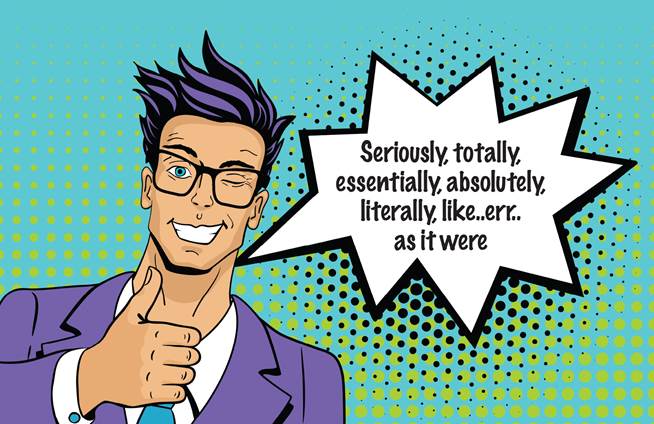Crutch words (filler, fluff, weasel words): they are usually words dropped into sentences in order to give the speaker more time to think, fill a gap in a conversation or to emphasise a statement.
Over time, they become unconscious verbal tics formed out of habit. They often add no meaning to a statement, and can be annoying to the listener.
Crutch words distract from the purpose of the message and dilute its strength. They are generally useless adverbs, overcompensating adjectives, unnecessary prepositions or hedging phrases. They can be commonly used or our own unique pet phrases.
An example of a crutch word: Actually. The word is meant to signify something that exists in reality, but it is more often used as a way to add punch to a statement (as in, “I actually have no idea”).
Another example (my pet hate): Literally. This adverb should be used to describe an action that occurs in a strict sense. But it is often used inversely to emphasise a hyperbolic or figurative statement: “I literally ran 300 kilometres today.”
And other examples:
- Honestly: Incorrectly used to attempt to assert authority or express incredulity.
- Basically: This word should signify something that is fundamental or elementary but is often used to try to signal truth, simplicity and confidence.
- Obviously: Often used to emphasise a point about things that aren’t necessarily obvious. It should signify an action which is readily observable, recognised or understood.
And there’s more: Seriously, Totally, Essentially, Absolutely, The thing is, For what it’s worth, At the end of the day, I’m not going to lie, To be honest, Really, Truly, Just, Like (Aargh!!), Look, Ultimately, To be fair, So, Well, In a weird way, You know, As it were, For the record and Fantastic/great/ really/very/awesome/super (lazy crutches).
Then there are the small “crutch-mumbles”; Um, Ah, Er, Uh. Useful occasionally but used too frequently they can make it difficult for the listener to retain the speaker’s point.
What crutch words do you rely on? Do you realise? To convey confidence, assurance, expertise and competence, speak definitively with precision.
Avoid the crutches. Think before you speak. Pause…… if necessary.
Jennifer Low
18 April 2018

